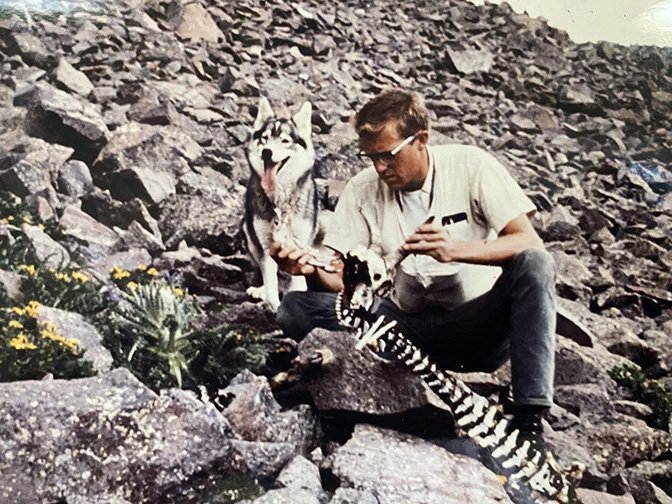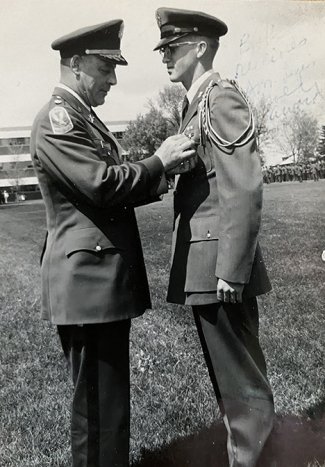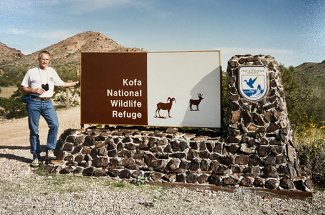
Robert Streeter, a 1963 wildlife conservation alum from near Madison has left an impactful and lasting mark on the conservation and management of wetlands and wildlife across North America through his 30-plus year career with the U.S. Fish and Wildlife Service and Ducks Unlimited.

During his time at South Dakota State University, Streeter was actively involved in several student clubs and organizations across campus such as the Wildlife Club, Agriculture Club, Little International, Alpha Zeta Agricultural Honors Fraternity, Arnold Air Society and Ag House Fraternity, which later became known as Alpha Gamma Rho Fraternity.
“I was active in a lot of different clubs,” Streeter said. “That is where I learned how to be organized, get along with a lot of people and get things done—that was as much of an education as the courses I took.”
Throughout his years on campus, he was selected as the Outstanding College of Agriculture Sophomore in 1961, served as the vice president of Students’ Association in 1962, was awarded the American Legion ROTC Leadership Award in 1963 and was a distinguished military graduate.
Nearly 60 years after his graduation from SDSU, Streeter was selected as one of six Distinguished Alumni honored as 2022 Legends and Leaders by the SDSU Alumni Association. Out of the 100,000 graduates in SDSU history, he is one of approximately 300 to receive the Distinguished Alumni award recognizing graduates who have demonstrated outstanding achievement in many areas of their lives.
After completing his undergraduate degree at SDSU, Streeter went on to pursue his master’s degree in wildlife ecology at Virginia Polytechnic Institute, where he completed a plant ecology study on elk herds and their impact on mountain habitats in the heart of Yellowstone National Park. Following the completion of his master’s degree, he pursued his Ph.D. in wildlife ecology at Colorado State University, where he studied and compared two different bighorn sheep herds in the mountainous areas of Colorado near Mount Evans and Buffalo Peaks. There, his studies focused on how habitat, disease, predation and other environmental factors influenced bighorn sheep population dynamics.
Upon earning his doctorate degree, Streeter entered the United States Air Force in 1969 as a captain at the Brooks Air Force Base U.S. Air Force School of Aerospace Medicine in San Antonio, Texas. During his 3 1/2 years there, he served as a research physiologist and instructor where he conducted research on the effects of adverse space environments on mammals.
Creating an impact for years to come
In 1972, he left the Air Force and joined the U.S. Fish and Wildlife Service, where he spent the next 20 years working in various research roles and another 10 years working in management of wetlands and wildlife refuges. During his last 10 years with the U.S. Fish and Wildlife Service, Streeter played an integral role in implementing the North American Waterfowl Management Plan and the associated North American Wetlands Conservation Act, which he describes as the highlight of his career. The plan was originally created in 1988 and was a collaborative effort between professionals in the United States, Canada and Mexico to restore and protect wetlands and related habitats that were beneficial to waterfowl and other wildlife species that use those habitats.

“The program has received increased funding from Congress every year since it was created,” Streeter said. “Now, 35 years later, the program is still going strong across all parts of North America.”
He served as the deputy and executive director of the program and later became the assistant director of refuges and wildlife for the U.S. Fish and Wildlife Service in Washington, D.C., a position in which he served from 1995 until his retirement in 1998. In this role, Streeter was responsible for policy, management and budgets for the National Wildlife Refuge System, the service’s land acquisition program, law enforcement, migratory bird management, and the North American Waterfowl Management Plan and Wetlands Conservation Act Program.
Continuing the impact beyond retirement
Upon his retirement, Streeter and his wife Karen moved back to Colorado, where he worked for Ducks Unlimited for two years as its Mexico and Latin American coordinator, developing a long-term plan for expanding Ducks Unlimited wetland habitat programs throughout Mexico, the Caribbean and South America from 1998-2000.
Since then, Streeter has remained actively involved in many wildlife and wetlands conservation and management efforts in Colorado and across the U.S.
In 2008, he was appointed by the governor of Colorado to serve as a commissioner with the Colorado Parks and Wildlife Commission for four years. During that time, he also served as a board member for Great Outdoors Colorado, a nonprofit organization that works to preserve and enhance Colorado’s state parks, trails, wildlife, rivers and open spaces by investing a portion of Colorado lottery proceeds toward those causes.
Over the past 20-plus years, Streeter has also volunteered his time with Colorado Trout Unlimited by coordinating its regulations and working alongside Colorado Parks and Wildlife, and with the Larimer County Open Lands Board buying and protecting lands for conservation and recreation. Additionally, he served as an environmental representative and vice chair of the South Platte Basin Roundtable for eight years where he helped develop the Colorado Water Plan to manage statewide waters.
“I had some really fantastic partners in all of these programs,” Streeter said. “Nobody does things alone, and you work on the shoulders of giants that have gone before you. I was really fortunate to have a life partner, like Karen, and many other great partners in my professional life—some that were teachers to me, and for others, I was a teacher to them.”
In his retirement, Streeter spends much of his time in nature taking outdoor photography, gardening, hunting, fishing, hiking, woodworking, making wine and training dogs. He and his wife also enjoy spending time with their children and grandchildren and traveling both domestically and internationally.
Today, he and his wife are sponsors of an endowed scholarship fund through the SDSU Foundation in memory of their parents who valued and nurtured the land they farmed, knowing it was previously home to native Dakotans.
“We did it in honor of my parents and Karen’s parents,” Streeter said. “We wanted to establish a scholarship to encourage young people who are planning to pursue a career in conservation work and want to conserve and protect South Dakota lands.”
Republishing
You may republish SDSU News Center articles for free, online or in print. Questions? Contact us at sdsu.news@sdstate.edu or 605-688-6161.

